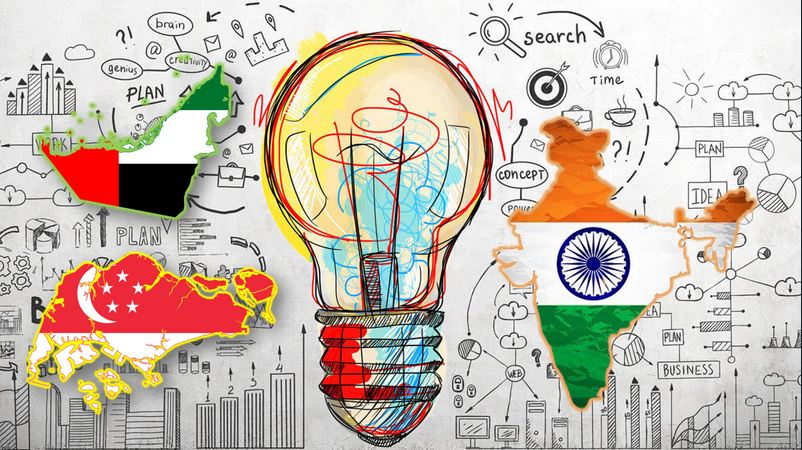A few days ago, India banned 54 Chinese for being a threat to national security. The banned apps included Sea Limited’s The Free Fire Game, which was the highest-grossing mobile game in India in the third quarter of 2021, according to industry tracker App Annie. The ban on Singapore-based Sea Limited (owned by China’s Tencent) delivered a 16 billion dollar blow to the company as the company has a very high number of users and significant revenue traction in India.
Not even a day passed from this loss, and the Singapore government started criticizing India. “Nehru’s India has become one where, according to media reports, almost half the MPs in the Lok Sabha have criminal charges pending against them, including charges of rape and murder. Though it is also said that many of these allegations are politically motivated,” said Singapore Prime Minister Lee Hsien Loong.
A country like Singapore, which is thriving by poaching Indian startups by illegal means, and is taking the moral high ground on various issues after the Indian government delivered a blow to a company hailing from the tiny country. Singapore is worried that slowly the Indian government put an end to its poaching practices.
In the last few years, India built a thriving Startup ecosystem with support and encouragement from the government and many private companies and individuals. Very few countries have a thriving startup ecosystem such as India and in this aspect, the country is the envy of the world.
However, a new problem is emerging in the Startups ecosystem as a few parasitic nations and jurisdictions like Singapore and Dubai are luring the Indian startups through legal and illegal means. These countries offer negligible tax rates, instant citizenship, and many other perks to startups and their founders in order to encourage them to move out of India.
Many startups have already fallen for that and registered the parent company outside India. So, now that the company starts making a profit, the corporate tax will be paid in these countries, intellectual property (IP) will be owned by these countries, and all the wealth of the founders will spend and be taxed in those countries.
India will lose billions of dollars to jurisdictions like Singapore, the UK, the US, and Dubai and will become nothing but suppliers of cheap and skilled labour. Foreign countries will reap the benefits of the billions of dollars spent by the government to build this thriving startup ecosystem.
Cars24, Udaan, Pinelabs, Meesho Payments, InMobi, Glance, Moglix, and Flipkart are some of the Startups that have registered the parent company in Singapore while having a primary revenue base and workforce in India. This issue, known as flipping, is already being raised by nationalist entrepreneurs and venture capitalists like Sridhar Vembu and Sanjeev Bhikchandani.
Sanjeev Bikchandani, one of the most successful Internet entrepreneurs of India and founder of Naukri.com, raised alarm over the colonisation of Indian startups by foreign venture capital firms. “Shades of the East India Company type of situation here – Indian market, Indian customers, Indian developers, Indian workforce. However 100% foreign ownership, foreign investors. IP and data transferred overseas. Transfer pricing issues foggy,” tweeted Bikchandani.
“Basically institutionalised transfer of wealth away from India while living off the Indian market and Indian labour somewhat like the days of the Company rule,” he added.
In the long Twitter thread, Bikchandani also explained how foreign investors are taking over the ownership of Indian startups. “You take an Indian startup and transfer ownership of all its shares to an overseas company that has been usually freshly floated just for this purpose. So now the Indian company becomes a 100% subsidiary of the overseas entity,” he revealed.
In the future, the value creation that will happen in these companies will go to foreign investors. “Believe a lot of future value creation will happen from startups that have flipped. Not saying ban flipping, create conditions to disincentive flipping,” warned Bikchandani.
This is an alarming trend rising in the country because through the colonization of Indian startups, the foreign investors will squeeze the consumers as well as the founders of the company in the future alike. The founders will be thrown out of the company just like Sachin and Binny Bansal were thrown out of Flipkart.
Moreover, in the last few years, it has been witnessed that the parent brand of Indian subsidiaries is asking for more and more royalty from the companies listed in India. For example, companies like Suzuki (parent company of Maruti Suzuki India), Hyundai (parent company of Hyundai India), and Unilever (parent company of Hindustan Unilever limited) have increased their royalty substantially in the last few years.
In fact, the royalties have gone so high that in August this year, Commerce Minister Piyush Goyal asked these companies to cut royalties to boost investment in India.
In the future too, internet startups would also either transfer whole profit to parent companies or transfer a significant part of it in the form of royalties. Therefore, the Modi government must act to bring foreign investment in Internet startups down and also institutionalize the seed funding so that startups need not run to foreign companies for capital.
